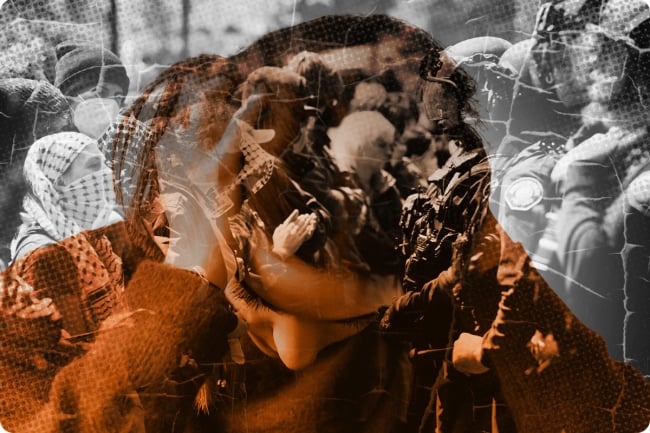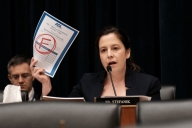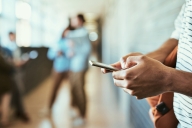You have /5 articles left.
Sign up for a free account or log in.

Research shows that discrimination, which both Jewish and Muslim students have faced in recent weeks, is tied to higher rates of anxiety, loneliness and suicidal ideation.
Photo illustration by Justin Morrison/Inside Higher Ed | Liza Summer/pexels | Mathieu Lewis-Rolland/Getty Images
Ever since the COVID-19 pandemic disrupted the lives of college students across the country, campuses have faced an epidemic of mental health challenges, including loneliness, anxiety and depression. Now, recent data from online counseling platforms show the mental toll has only increased as students try to make sense of the complex conflict in Gaza and the ensuing protests that have divided college campuses.
Officials from BetterMynd, a 2017 startup that provides supplemental, online mental health services to over 100 colleges, noted in a statement “a clear higher need for support” since Hamas attacked Israel on Oct. 7—and especially in recent weeks. Typically, the request for services begins to drop off in April, as students prepare for finals and pack up to head home for the summer, BetterMynd’s founder and CEO Cody Semrau said. But that wasn’t the case this year.
In April 2022, for instance, the company and its 400 licensed providers received about 20 percent fewer counseling requests than in March of that year, company data show. But between March and April of this year, requests only dropped by 4 percent.
“We have definitely seen an uptick this year in demand from students across the board,” Semaru said. “And we think a lot of that is due to the tensions on campus and the protests that students are experiencing.”
A Sense of Instability
Student protesters have been active on college campuses from coast to coast since last fall, when the war between Israel and Hamas first began. Yet the tension and scope of the demonstrations has escalated significantly since last month, when pro-Palestinian student protesters at Columbia University set up an encampment on a lawn and were arrested en masse a day later.
The movement spread rapidly as student activists across the country pitched their own tents and called for divestment. It drew in Ivy League institutions like Yale University as well as public flagships—such as the Universities of Michigan, California, Los Angeles and Texas at Austin—and small, private liberal arts colleges like Emerson.
As protesters and counterprotesters garnered attention from national news organizations and federal legislators, college and university presidents reacted in various ways, with some calling on law enforcement to tear down encampments and arrest students.
Nance Roy, Chief Clinical Officer of The Jed Foundation (JED), a suicide prevention nonprofit, said tension over the Israel-Hamas conflict is merely the latest issue to challenge students’ sense of security, and she’d be surprised if young people weren’t grappling with the most recent global events. (This paragraph has been updated to correct the spelling of Nance Roy's name and the description of JED.)
“We all have been struggling with many of the environmental, societal, socio-economic and socio-political events, but our young people in particular, they haven’t known a world other than this one,” Roy said. “People in my generation, we have a larger context in which to place a lot of this instability and the challenges that we’re facing, whereas this is their norm.”
Uwill, another digital mental health services platform, saw a 28 percent month-over-month increase in appointments scheduled from September 2023 to October of that same year. Uwill CEO Michael London also noted that more students have been asking for therapists who identify as Muslim or Jewish.
“Global events impact student mental and emotional health and well-being,” he said in an emailed statement. “It is imperative that students receive immediate support from counselors who are relatable to them.”
JED has not heard reports of students flocking to in-person counseling centers at the more than 440 colleges and universities it partners with, Roy said. But that doesn’t mean they aren’t seeking support elsewhere.
“They may be going to other places on campus. For example, if there’s student groups that share their identity, or a diversity and inclusion office, or a particular faculty member or student affairs professional,” students may go there before scheduling an appointment with a therapist, she said. “Everyone has a role to play. There is no wrong door for a student to walk through for a warm hand or support.”
‘Ripple Effects’
Many students have expressed a heightened sense of fear and vulnerability in the face of volatile public reactions to the Israel-Hamas war.
Data show that reported instances of both antisemitism and Islamophobia have risen dramatically. A November report from the Anti-Defamation League found 73 percent of Jewish college students had experienced or witnessed antisemitism since the start of the 2023–24 academic year—up from 32 percent in 2021. An April report from The Council on American-Islamic Relations documented 8,061 overall bias reports in 2023. That’s a 56 percent jump over the previous year; nearly half of the reported incidents came in the last three months of the year, and 8.5 percent involved schools—including colleges and universities.
Recent research from Penn State’s Center for Collegiate Mental Health shows that students who experience discrimination demonstrate substantially higher levels of distress, social isolation and suicidal ideation, prompting many to seek counseling.
Mental health advocates note that this is not an anomalous spike, and that students will continue to need support in processing global events even after all the encampments are dismantled. College campuses have long been crucibles of activism and fiery debate over complex, controversial topics, and administrators will continue to face the challenge of upholding free speech rights while protecting students’ physical and mental health.
“The greatest effects on students and campuses are not on the protesters themselves. It’s really the rest of the community, the individuals on the campus who feel affected and psychologically unsafe because of what’s going on in the tensions and divisions on their campuses,” said Semrau from BetterMynd. “When there are these protests on campus that are creating violence, affecting their finals, their graduation ceremonies, it does have ripple effects.”
One potential ramification could be on enrollment.
“Colleges and universities are seeing this enrollment cliff upcoming. So it’s more important than ever to invest in retaining students, and that [lack of] mental health support is one of the top reasons that students are dropping out of school,” he added.
Last week the student editors of The Columbia Law Review wrote a letter to the law school’s administrators, urging them to cancel finals—or at least calculate all exam grades as pass/fail in an effort to recognize the challenges students have faced during this “horrific time” for the campus community.
“We do not think it is inconsistent with being a leading voice in legal academia and legal scholarship to prioritize students’ health and safety over grades,” the letter read. “Many are unwell at this time and cannot study or concentrate while their peers are being hauled to jail.”
Roy said that although every situation is different, “one of the most basic things” college leaders can do is listen to their students’ concerns.
“People need to first be able to have the experience that is being heard, acknowledged and taken into consideration,” she said. “Otherwise, what winds up happening is people feel the need to speak louder and louder and louder and louder.”
After that, it’s a matter of actively ensuring a sense of confidence, safety, belonging and collaboration on campus, Roy added. She urged administrators to lead by example.
“Engage in a constructive, transparent conversation about what is it that we can do? What is realistic? How can we brainstorm potential solutions together?” she said. “True leaders need to be transparent about what they’re doing, or not doing and why, making sure that there are safety protocols and resources for students who are struggling.”








